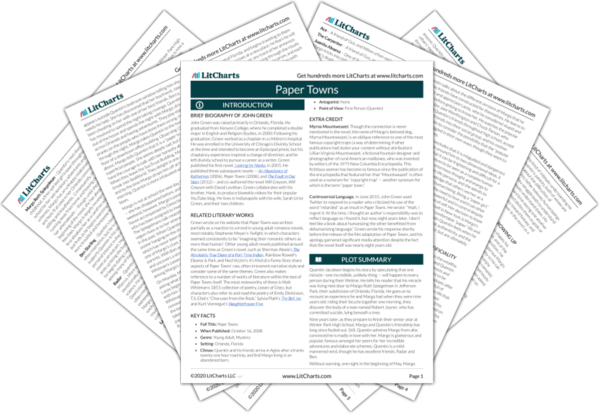Margo struggles to find meaning in the wealthy, suburban environment where she and Quentin have grown up. She disdains the interests and values of her family and friends, whom she believes to be superficial. Her favorite metaphor, which Quentin adopts after her disappearance, is that Orlando is a “paper town” full of “paper people,” where nobody cares about the things in life that truly matter. Quentin finds the idea intriguing, and he uses Margo’s language to justify his own bitter attitude toward his community and classmates. He finds his cynicism challenged on his last day of school, however, when he reflects on the way his adolescent experiences have shaped him and think “[t]he town was paper, but the memories were not.” There is a sense that the world appears artificial because Margo — and, to a somewhat lesser extent, Quentin — chooses to see it that way, and that people are shallow and two-dimensional only when the person observing them does not make the effort to see their humanity.
Both Margo and Quentin have a difficult time being honest and direct about their thoughts and feelings. Each of them deals with this in different ways. Margo plans grand gestures and allows other people to interpret her actions however they wish, which spares her the responsibility of explaining her feelings to anyone. Quentin accepts the status quo and works to fulfill others’ expectations for him, making it easy for him to move through life without questioning himself or being questioned by others. Both rely on words written by other people to express themselves in conversation. Margo is constantly quoting poetry and novels, and Quentin learns to do the same as he immerses himself in the poetry she loved. However, in his final conversation with Margo, Quentin designs a metaphor of his own for talking about loneliness and connection—that people are born as perfect vessels that then develop cracks through their lives—and in doing so illustrates a new willingness to make himself vulnerable by speaking what he truly thinks.
Quentin’s conversation with Margo about the different metaphors for human experience and connection also illustrates the ways in which his pursuit of her has helped him think more deeply about his own values and desire. His final decision to return home and continue on his chosen path rather than following Margo to New York forces Quentin to recognize how difficult it can be to know one’s true self. He believes that returning to Orlando and going to college is what he sincerely wants for himself, but Margo, who hoped that including Quentin in her adventures would liberate him from the confining values of their community, questions whether he is simply afraid to do something unconventional. Though her effect on Quentin is different than the one Margo planned, his ability to make choices for himself rather than following her prescription for him is strong evidence that he has abandoned his “paper” way of living and committed himself to a search for personal happiness.
Authenticity and Artificiality ThemeTracker

Authenticity and Artificiality Quotes in Paper Towns
It was so pathetically easy to forget about Chuck, to talk about prom even though I didn’t give a shit about prom. Such was life that morning: nothing really mattered much, not the good things and not the bad ones. We were in the business of mutual amusement, and we were reasonably prosperous.
“Did you know that for pretty much the entire history of the human species, the average life span was less than thirty years? You could count on ten years or so of real adulthood, right? There was no planning for retirement. No planning for a career. There was no planning … And now life has become the future. Every moment of your life is lived for the future.”
“It’s a paper town. I mean, look at it, Q: look at all those cul-de-sacs, those streets that turn in on themselves, all the houses that were built to fall apart. All those paper people living in their paper houses, burning the future to stay warm. All the paper kids drinking beer some bum bought for them at the paper convenience store. Everyone demented with the mania of owning things. All the things paper-thin and paper-frail. And all the people, too. I’ve lived here for eighteen years and I have never once in my life come across anone who cares about anything that matters.
YOU WILL GO TO THE PAPER TOWNS
AND YOU WILL NEVER COME BACK
“People love the idea of a paper girl. They always have. and the worst thing is that I loved it, too. I cultivated it, you know … Because it’s kind of great, being an idea that everybody likes. But I could never be the idea to myself, not all the way.”
















